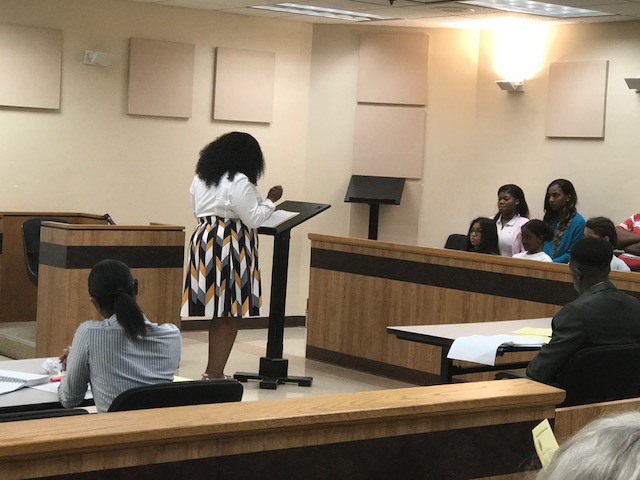Youth Court is in Session at PBL!
January 31, 2018
Youth Court is held at Palm Beach Lakes Community High School once a month. It gives the Law Academy students at PBL the opportunity to put their classroom knowledge into practice. The students serve as attorneys (defense and prosecution), court clerk, jury members, and of course, audience members. We have numerous volunteers such as Michael Gelfand, who presides over the case as judge; Attorney Jean Middleton, who assists the Law Academy instructor (Attorney Jeffery Van Treese); Linda McCoy-McNeal, Youth Court Specialist, and several deputy officers for the Youth Court Division at the Palm Beach County School District. To find out more about Youth Court and its purpose, see the below article published in a publication of the National Criminal Justice Reference Service (NCJRS).
“Youth courts (also called teen, peer, and student courts) are diversion programs in which youth are sentenced by their peers for minor crimes, offenses, and/or violations. Administered and operated most often on a local level by law enforcement agencies, probation departments, juvenile courts, schools, and/or nonprofit organizations, these programs offer communities an opportunity to provide immediate consequences for primarily first-time youthful offenders (Global Youth Justice, retrieved March 2014).
Youth court diversion programs are intended to offer an alternative to the traditional juvenile justice system and school disciplinary proceedings. Typically, youth court offenders are first-time offenders between ages 11 and 17 who have been charged with misdemeanor or status offenses, with offenses including theft, vandalism, disorderly conduct, assault, and possession of marijuana. Additionally, youth courts have been used to handle school disciplinary issues, underage drinking, and tobacco possession cases (Youth Courts: An Empirical Update and Analysis of Future Organizational and Research Needs, Office of Juvenile Justice and Delinquency Prevention-Sponsored, 2008).
Youth court diversion programs offer an avenue for engaging the community in a partnership with the juvenile justice system to respond to the problem of juvenile crime by (1) increasing awareness of the delinquency issues within the local community, and (2) mobilizing community members (including youth) to take an active role in addressing the problem of juvenile crime within the community (Peer Justice and Youth Empowerment: An Implementation Guide for Teen Court Programs, Office of Juvenile Justice and Delinquency Prevention).
These juvenile justice voluntary diversion programs harness positive peer pressure and utilize it in a peer judgment setting to help address the anti-social, delinquent, and/or criminal behavior of youth. The peer judgment and positive peer pressure aspects of teen/youth court diversion programs are the two primary programmatic elements which separate these from other youth/juvenile justice voluntary diversion programs (Made in America: The Global Youth Justice Movement, 2009).”


Debi Elfen • Feb 1, 2018 at 9:23 am
I believe that Youth Court is such a wonderful program. Not only does it allow students to learn more about the justice system, but it allows offenders to better understand their behavior and take responsibility for it.